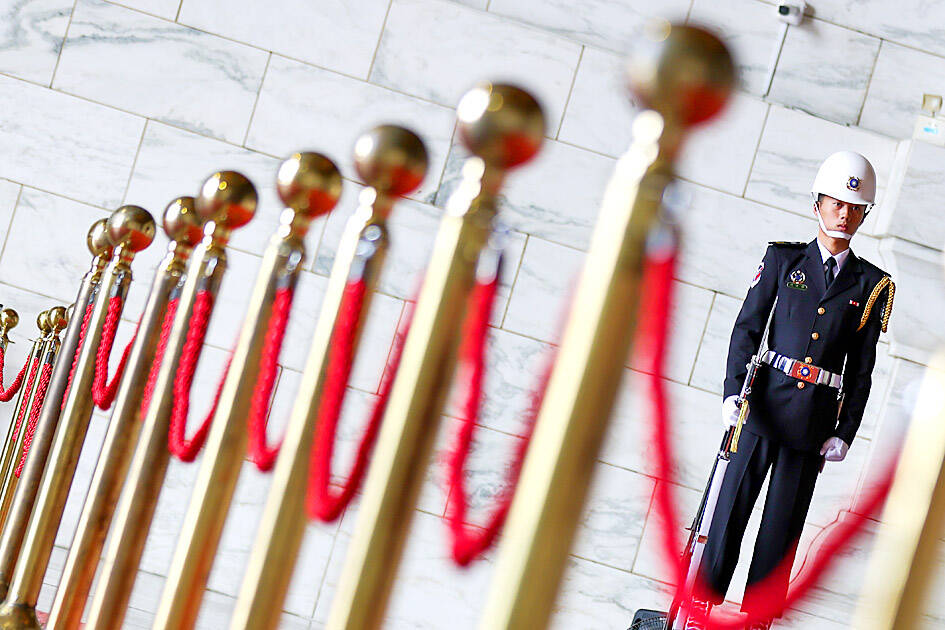A Taiwan Strait crisis is likely to occur this year, US and Taiwan experts say, according to a report published on Monday by the Center for Strategic and International Studies.
The Washington-based think tank’s China Power Project partnered with the Institute for National Defense and Security Research to survey 52 US and 35 Taiwanese experts from Nov. 28 to Dec. 15 last year, prior to the presidential and legislative elections on Jan. 13, on their evaluations of China’s approach to Taiwan.
More than half of the experts said they believed a crisis in the Taiwan Strait is “very likely” or “likely” this year, at 67 percent of US experts and 57 percent of Taiwanese experts respectively, the report showed.

Photo: Ritchie B. Tongo, EPA-EFE
Three-quarters of the US experts and two-thirds of the Taiwanese experts said that a meeting between US President Joe Biden and Chinese President Xi Jinping (習近平) in November last year “did not stabilize relations such that it significantly reduced the potential of a Taiwan Strait crisis,” it said.
Three out of five US experts said they believed that Beijing is most likely to conduct a “large-scale military exercise encircling Taiwan to achieve temporary blockade-like effects” this year if its leaders consider Taiwan’s election results unfavorable to Chinese interests, with 43 percent of the Taiwanese experts agreeing.
About half of the Taiwanese experts, 49 percent, considered “highly coercive nonmilitary actions” to be the most likely action Beijing takes in such a situation.
On when China would take such an action, 42 percent of the US experts and 43 percent of the Taiwanese experts said that Beijing would “wait to assess if the new president implements significant policy changes before responding,” while 34 percent of the Taiwanese experts said that it would do so by the inauguration of the new president on May 20.
A majority of the experts said that although China has the capability to launch a blockade of Taiwan, it could not mount an effective invasion, the report said.
An invasion would be more complicated than a blockade and require a much larger commitment of military forces, it said, adding that the likelihood of military intervention by the US and its allies might also be a factor.
The experts said that international partners are more likely to intervene if China launched an invasion, compared with a blockade, in the next five years.
Ninety-six percent of the US experts were “moderately” to “completely” confident that the US would intervene in the event of an invasion, while 72 percent of Taiwanese experts agreed.
If China’s primary goal is to coerce Taiwan into changing certain policies rather than annex it the next five years, the majority of the experts said it would most likely resort to blockading the nation, the report said.
If the aim is to force an immediate unification, most experts said that Beijing would mostly likely seek to launch a “highly kinetic joint blockade of Taiwan.”
Regarding whether China would be willing to use a nuclear weapon against the US or its allies in a conflict over Taiwan, 89 percent of Taiwanese experts said “no,” while only 56 percent of US excerpts agreed.

Chinese spouse and influencer Guan Guan’s (關關) residency permit has been revoked for repeatedly posting pro-China videos that threaten national security, the National Immigration Agency confirmed today. Guan Guan has said many controversial statements in her videos posted to Douyin (抖音), including “the red flag will soon be painted all over Taiwan” and “Taiwan is an inseparable part of China,” and expressing hope for expedited reunification. The agency last year received multiple reports alleging that Guan Guan had advocated for armed reunification. After verifying the reports, the agency last month issued a notice requiring her to appear and explain her actions. Guan

GIVE AND TAKE: Blood demand continues to rise each year, while fewer young donors are available due to the nation’s falling birthrate, a doctor said Blood donors can redeem points earned from donations to obtain limited edition Formosan black bear travel mugs, the Kaohsiung Blood Center said yesterday, as it announced a goal of stocking 20,000 units of blood prior to the Lunar New Year. The last month of the lunar year is National Blood Donation Month, when local centers seek to stockpile blood for use during the Lunar New Year holiday. The blood demand in southern Taiwan — including Tainan and Kaohsiung, as well as Chiayi, Pingtung, Penghu and Taitung counties — is about 2,000 units per day, the center said. The donation campaign aims to boost

The Kaohsiung Tourism Bureau audited six hotels in an effort to prevent price gouging ahead of Korean band BTS’ concert tour in the city scheduled for Nov. 19, 21 and 22 this year. The bureau on Friday said that the audits — conducted in response to allegations of unfair pricing posted on social media — found no wrongdoing. These establishments included the local branches of Chateau de Chine, Hotel Nikko, My Humble House, and Grand Hai Lai, it said, adding that the Consumer Protection Commission would have penalized price gougers had the accusations been substantiated. The bureau said the Tourism Development Act

BACK TO WINTER: A strong continental cold air mass would move south on Tuesday next week, bringing colder temperatures to northern and central Taiwan A tropical depression east of the Philippines could soon be upgraded to be the first tropical storm of this year, the Central Weather Administration (CWA) said yesterday, adding that the next cold air mass is forecast to arrive on Monday next week. CWA forecaster Cheng Jie-ren (鄭傑仁) said the first tropical depression of this year is over waters east of the Philippines, about 1,867km southeast of Oluanpi (鵝鑾鼻), and could strengthen into Tropical Storm Nokaen by early today. The system is moving slowly from northwest to north, and is expected to remain east of the Philippines with little chance of affecting Taiwan,